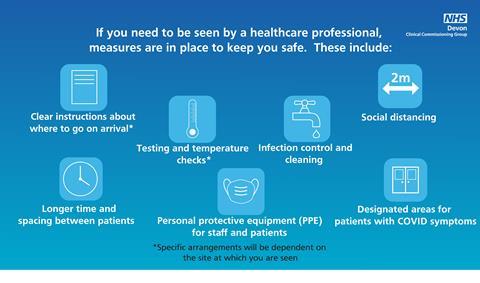Citizens panels can help health and care partnerships to better understand residents’ experience and aspirations, by Dame Suzi Leather

Covid-19 continues to bring enormous challenges to the NHS as we work to restore services, learn lessons, and prepare for further outbreaks. With the pandemic have come concerns that the voice of the public has been lost as services have moved urgently to respond and adapt.
Sponsored by
In Devon we have sought to understand public views throughout. We are not alone in this, with NHS colleagues all over the country doing the same – working through tried and tested partnerships and developing innovative approaches to engage with local people.
Devon, like many other Integrated Care Systems, developed a citizens panel during 2019. The “panel” concept had proved a success in enabling other systems to hear views on local services from a representative sample of the local population. Panels are now operating or planned in 21 areas of the country covering over 27 million people. They are used regularly to assess public opinions and they usually operate online, with panel members receiving regular surveys via email.
In Devon, our Virtual Voices panel has over 1,700 members from all parts of our large, rural system, recruited using market research techniques to help us reach out to “harder to hear” voices. We carry out regular online surveys with the panel, including seeking views to inform Devon’s long-term plan.
The panel is a great tool to help our system leadership team understand the experience and aspirations of Devon residents, giving insights that can influence activity and inform decision-making.
The panel proved a real asset as we responded to the demands of covid. We saw a dramatic reduction in attendances at emergency departments and other services and there is continuing concern about the future impact of this on patient outcomes.
Insights from the Devon Virtual Voices panel proved invaluable in helping to adapt and target our communication encouraging people to use the NHS when they needed it. Responses, turned around in just one week, helped us understand the reassurance residents needed to access health services. We were able to develop messages for GPs to use during telephone triage.
The same messages were adapted by secondary care colleagues in appointment letters, and used by our clinical spokespeople in media interviews and in social media campaigns. These included explaining “measures in place to keep you safe” on social distancing, PPE, designated areas for covid symptomatic patients, and testing and temperature checks.
The panel complements other engagement approaches like the detailed dialogue we’ve had on proposed changes to community hospitals where we have worked with local residents to co-design better solutions. But the panel has come into its own during the pandemic and we have plans to expand membership and use it to support restoration and recovery of health and care services in the next phases of our response. We’re also investigating a system-wide virtual clinical panel to support our clinical engagement.
As the STP non-executive chair I’ve valued the insights that Devon Virtual Voices has given us into the concerns of residents at a critical time – and the speed and flexibility to hear from a good sample of residents under lockdown conditions.
Further detail about Devon CCG’s approach to community involvement for service change is explained in this short film.
























